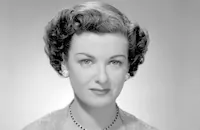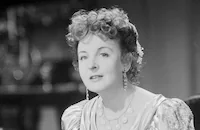Disraeli

Brief Synopsis
Cast & Crew
Alfred E. Green
George Arliss
Joan Bennett
Florence Arliss
Anthony Bushell
David Torrence
Film Details
Technical Specs

Synopsis
British Prime Minister Benjamin Disraeli is stymied by Liberal opponent Gladstone in an attempt to appropriate an unusually large slice of power and financial credit, and, feeling "bound to furnish [his] antagonists with arguments, but not with comprehension," he retires to his country estate, Hughenden, amidst public agitation. A mysterious Mrs. Travers, whom Disraeli knows to be a Russian spy, learns of Disraeli's intention to buy the Suez Canal from Egypt and ensure England's Indian Empire, when the prime minister receives a coded telegram indicating Egyptian khedive Ismail Pasha's immediate financial throes and his susceptibility to an offer. Unable to obtain credit from the Bank of England, he arranges through international Jewish banker Hugh Meyers for funding and dispatches Charles (Lord Deeford) with Meyer's check to Cairo. Charles arrives ahead of Foljambe, Mrs. Travers' accomplice, and obtains the controlling shares in the Canal, but Disraeli's elation is shortlived as Meyers informs him of his firm's bankruptcy. Disraeli bluffs the reluctant Bank of England manager, Lord Probert, into honoring the check, and Queen Victoria later graces a reception at Downing Street honoring Disraeli, who has made her "Empress of India."

Director
Alfred E. Green
Cast

George Arliss

Joan Bennett

Florence Arliss

Anthony Bushell
David Torrence

Ivan Simpson

Doris Lloyd
Gwendolen Logan
Charles E. Evans
Cosmo Kyrle Bellew
Jack Deery
Michael Visaroff
Norman Cannon
Henry Carvill
Shayle Gardner
Powell York
Margaret Mann
Crew

Photo Collections
Videos
Movie Clip



Trailer
Film Details
Technical Specs

Award Wins
Best Actor
Award Nominations
Best Picture
Best Writing, Screenplay
Articles
Disraeli
Okay, one clearly has to take Disraeli (1929) with a grain of salt as it reduces a complex piece of history to a simple story of spy vs. spy in virtually one set piece; historians also love to point out the factual error that it was not Hugh Myers, who bankrolls the Suez scheme, as is depicted in the film, but the Rothschild family who came to Disraeli's aid. It also helps if one is sympathetic to the rather static, stage-bound production and inferior sound. After all, it was 1929 and Hollywood was still making the transition from an era of silent films to 'talkies.'
Despite these shortcomings, George Arliss shines in the title role. Arliss played the role of Benjamin Disraeli on stage and in a silent version from 1921 and the part is a wonderful showcase for his talents. This version from 1929 was his sound debut. He was already 61 years old, yet displays the verve of a much younger performer. His rich, stage-trained voice, expansive gestures and distinguished stage "pedigree", earned Arliss the moniker: "The first gentleman of the talking screen". While some critics accused Arliss of being a 'ham,' his theatrical background served him well in Disraeli and he was awarded the Best Actor Oscar® for his performance, beating out Wallace Beery, Maurice Chevalier, Ronald Colman, and Lawrence Tibbet in competing films.
Film buffs might also get a kick out of watching a young ingenue in this film named Joan Bennett. She was just 19 years old, and appearing in only her second starring role. Yet this film, following her success in Bulldog Drummond (1929) with Ronald Colman, saw her stock rise in popularity, matching her sister's (Constance Bennett) status as a rising young star in Hollywood.
Director: Alfred E. Green
Screenplay: Julien Josephson
Cinematography: Lee Garmes
Film Editing: Owen Marks
Original Music: Louis Silvers
Principal Cast: George Arliss (Disraeli), Joan Bennett (Lady Clarissa Pevensey), Florence Arliss (Lady Mary Beaconfield), Anthony Bushell (Charles/Lord Deeford), David Torrence (Lord Probert)
BW-89m.
by Michael Toole

Disraeli
Quotes
I do not discuss politics with women.- Deeford
I do.- Disraeli
War is never a solution. It's an aggravation.- Disraeli
A man who never makes jokes is a standing joke to the world.- Disraeli
Why do you dislike Mr. Disraeli so much?- Lady Clarissa Pevensey
I neither like him nor dislike him. He's nothing to me.- Lord Charles Deeford
Don't you feel lonely?- Lady Clarissa Pevensey
Lonely?- Lord Charles Deeford
Behold! Winter hand in hand with spring. Innocence with...- Benjamin Disraeli
Guile?- Lord Charles Deeford
Experience. Same thing.- Benjamin Disraeli
Trivia
Notes
Disraeli was nominated for an Academy Award in the Outstanding Production category. George Arliss won in the Best Actor category. AMPAS sources note that when Arliss was nominated, his performances in both this film and The Green Goddess (see below) were under consideration. At the awards ceremony, however, only his Disraeli performance was acknowledged.















